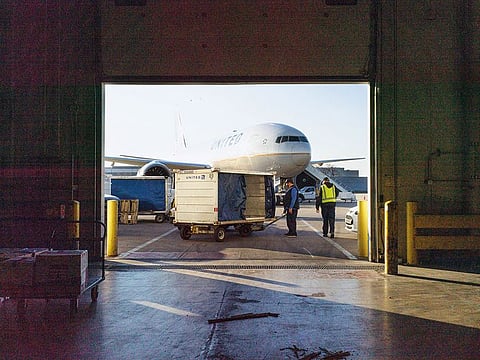Cargo shipments turn costlier as UAE operators raise rates over surging fuel costs
For some of these cargo firms, it is the second time they have raised rates

Dubai: Sending shipments into and out of the UAE will cost more with cargo operators planning to hike rates in response to the surge in fuel prices, with oil at around $110 a barrel.
The ongoing Russia-Ukraine conflict has pushed jet fuel prices to over $140 a barrel and operators are feeling the pinch. “Whatever the corresponding cost increase is, it will definitely get passed on to the customer,” said Harish Kumar, General Manager at Allcargo Logistics. The operator hiked its freight charges by 5-10 cents per kilogram and that could go up to 15-20 cents if high oil prices are to stay.”
Unless and until the turmoil subsides, this is not going to change.

Atlas Cargo, which ships extensively to the Philippines, charges about Dh14 per kg. The company raised rates in December and there will be further hikes.
We haven’t yet received new rates, but we need to raise them because the delivery and collection expenses have increased.

Airlines too
Emirates Skycargo, the cargo unit of the Dubai-based airline, will increase its fuel surcharge if prices continue their upward trajectory. Emirates SkyCargo, like many other airlines, adjusts its fuel surcharge according to a Fuel Surcharge Index.
The Index, which is based on the average price of aviation fuel in five key spot markets, has reached 217 points. Currently, the freight operator charges 27 cents per kg (Dh1) as fuel surcharge for short-haul routes, 45 cents (Dh1.65) for medium-haul and 63 cents (Dh2.31) for long-haul. If the index exceeds 183 points for the next two consecutive weeks, short-haul trips will carry a fuel surcharge of 30 cents per kg (Dh1.1). For medium and long-haul routes, the charges will be 50 cents (Dh1.84) and 70 cents (Dh2.57), respectively.
Sea cargo
It’s not just air cargo that is getting more expensive - transport by sea is also getting dearer. Kenneth Dsouza is the CEO of Store2Door, a platform that leverages retailer and logistics alliances to deliver products anywhere in the world. “Customers are now spending less or are carefully selecting items before shipping - freight rates have gone up for both air and sea,” said Dsouza. “The increase in rates has been due to the shortage of space and now from fuel prices going up as well.”
The International Air Transport Association (IATA) has said that the airspace closures caused by the ongoing Russia-Ukraine conflict will impact air cargo demand. “We can expect cargo markets to be impacted by the Russia-Ukraine conflict. Sanction-related shifts in manufacturing and economic activity, rising oil prices and geopolitical uncertainty are converging,” said Willie Walsh, IATA’s Director-General. “Capacity is expected to come under greater pressure and rates are likely to rise. To what extent, however, it is still too early to predict.”
The industry body said that while the conflict will stop direct connectivity to many markets connected to Russia, the overall impact on global markets will be low. Cargo carried to and from - and within - Russia accounted for just 0.6 per cent of the global cargo carried by air in 2021. IATA noted that several specialized cargo carriers are registered in Russia and Ukraine, particularly those involved with heavy lift operations.
Sign up for the Daily Briefing
Get the latest news and updates straight to your inbox


